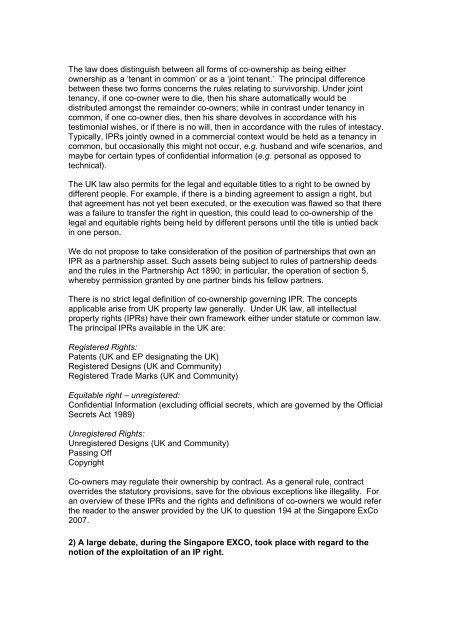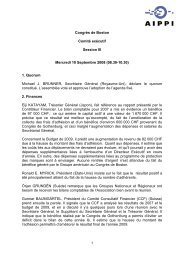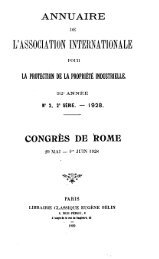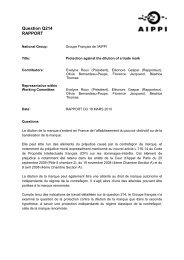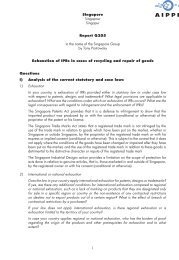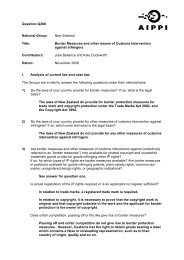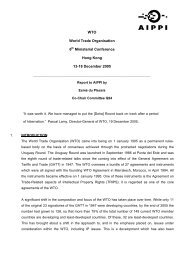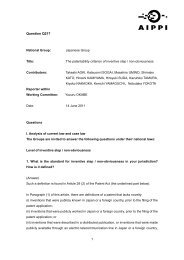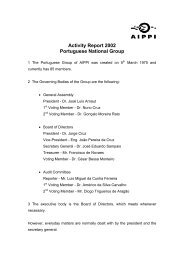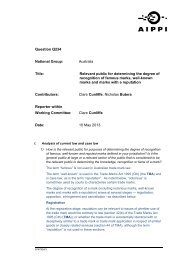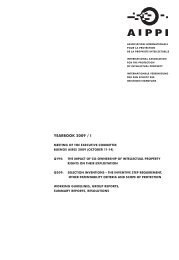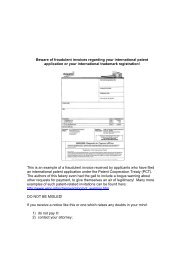Question Q194 National Group: United Kingdom Title: The ... - AIPPI
Question Q194 National Group: United Kingdom Title: The ... - AIPPI
Question Q194 National Group: United Kingdom Title: The ... - AIPPI
You also want an ePaper? Increase the reach of your titles
YUMPU automatically turns print PDFs into web optimized ePapers that Google loves.
<strong>The</strong> law does distinguish between all forms of co-ownership as being either<br />
ownership as a ‘tenant in common’ or as a ‘joint tenant.’ <strong>The</strong> principal difference<br />
between these two forms concerns the rules relating to survivorship. Under joint<br />
tenancy, if one co-owner were to die, then his share automatically would be<br />
distributed amongst the remainder co-owners; while in contrast under tenancy in<br />
common, if one co-owner dies, then his share devolves in accordance with his<br />
testimonial wishes, or if there is no will, then in accordance with the rules of intestacy.<br />
Typically, IPRs jointly owned in a commercial context would be held as a tenancy in<br />
common, but occasionally this might not occur, e.g. husband and wife scenarios, and<br />
maybe for certain types of confidential information (e.g. personal as opposed to<br />
technical).<br />
<strong>The</strong> UK law also permits for the legal and equitable titles to a right to be owned by<br />
different people. For example, if there is a binding agreement to assign a right, but<br />
that agreement has not yet been executed, or the execution was flawed so that there<br />
was a failure to transfer the right in question, this could lead to co-ownership of the<br />
legal and equitable rights being held by different persons until the title is untied back<br />
in one person.<br />
We do not propose to take consideration of the position of partnerships that own an<br />
IPR as a partnership asset. Such assets being subject to rules of partnership deeds<br />
and the rules in the Partnership Act 1890; in particular, the operation of section 5,<br />
whereby permission granted by one partner binds his fellow partners.<br />
<strong>The</strong>re is no strict legal definition of co-ownership governing IPR. <strong>The</strong> concepts<br />
applicable arise from UK property law generally. Under UK law, all intellectual<br />
property rights (IPRs) have their own framework either under statute or common law.<br />
<strong>The</strong> principal IPRs available in the UK are:<br />
Registered Rights:<br />
Patents (UK and EP designating the UK)<br />
Registered Designs (UK and Community)<br />
Registered Trade Marks (UK and Community)<br />
Equitable right – unregistered:<br />
Confidential Information (excluding official secrets, which are governed by the Official<br />
Secrets Act 1989)<br />
Unregistered Rights:<br />
Unregistered Designs (UK and Community)<br />
Passing Off<br />
Copyright<br />
Co-owners may regulate their ownership by contract. As a general rule, contract<br />
overrides the statutory provisions, save for the obvious exceptions like illegality. For<br />
an overview of these IPRs and the rights and definitions of co-owners we would refer<br />
the reader to the answer provided by the UK to question 194 at the Singapore ExCo<br />
2007.<br />
2) A large debate, during the Singapore EXCO, took place with regard to the<br />
notion of the exploitation of an IP right.


